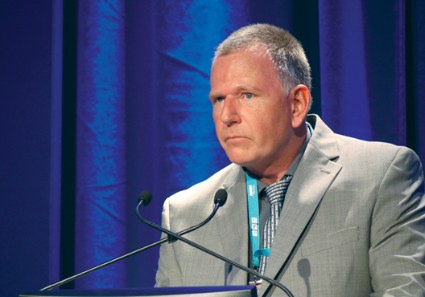User login
AMSTERDAM – Both progression-free and overall survival were improved by the addition of nintedanib to standard chemotherapy with docetaxel in the second-line treatment of non–small-cell lung cancer in a randomized phase III trial.
Results of the LUME-Lung 1 trial showed progression-free survival of 3.5 months in patients treated with nintedanib plus docetaxel versus 2.7 months for those treated with placebo plus docetaxel (hazard ratio [HR] = 0.85, P = .007) at a data cut-off of February 2013.
"To date, no targeted agent had been shown to prolong overall survival when combined with second-line chemotherapy," said Dr. Anders Mellemgaard of Herlev University Hospital, Copenhagen.
Overall survival was a median of 10.1 months with combination treatment and 9.1 months with docetaxel alone (HR = 0.94; P = .02720). The overall survival results were significantly better in patients with adenocarcinoma (12.6 months vs. 10.3 months, HR = 0.83, P = .0359) and in those adenocarcinoma patients treated within 9 months of the completion of first-line therapy (10.9 vs. 7.9 months, HR = 0.75, P = .0073).
"Patients with advanced non–small-cell lung cancer who have first-line chemotherapy will progress at one point or another," Dr. Mellemgaard said at the multidisciplinary European cancer congresses. Docetaxel is a standard of care for second-line treatment of NSCLC, even though the effects of such treatment are rather modest. Nintedanib is an oral angiokinase inhibitor that blocks the receptors for vascular endothelial growth factor, fibroblast growth factor, and platelet-derived growth factor receptor.
The LUME-Lung 1 trial comprised 1,314 patients with stage IIIB/IV or recurrent non–small cell lung cancer. Subjects were randomized to treatment with docetaxel at 75 mg/m2 on day 1 of a 21-day cycle; 655 patients were randomized to nintedanib 200 mg and 659 patients were given placebo given twice daily on days 2-21. Monotherapy with nintedanib was allowed after four or more cycles of combination therapy.
"Patients with adenocarcinoma histology had significantly improved overall survival with nintedanib," Dr. Mellemgaard said. An exploratory analysis is looking at patients with adenocarcinoma and progressive disease as the best response to first-line treatment showed a 3.5-month survival gain by using the targeted therapy (HR = 0.62, P = .0246).
Diarrhea was the most common adverse effect reported in the combination treatment arm (any grade 43.3% vs. 24.6% in the control group; 6.3% vs. 3.6% for grade 3 or higher). Other common adverse effects were elevated alkaline phosphatase (any grade 37.8% vs. 9.3%; grade 3 or higher 11.6% vs. 0.9%) and fatigue (any grade 30.9% vs. 29.4%; grade 3 or higher 4.7% vs. 4.2%).
"This toxicity was manageable by dose reductions and supportive care," Dr. Mellemgaard observed.
Dr. Mellemgaard is a member of an advisory board for Boehringer Ingelheim, which funded the study.
Dr. W. Michael Alberts, FCCP, comments: Another "nib" drug makes good. There are so many of them, it's hard to keep them straight (e.g., gefitinib, crizotinib, afatinib, erlotinib) but that's a good problem to have. This "nib" drug, Nintedanib, is an oral angiokinase inhibitor that apparently successfully interferes with angiogenesis. A sobering fact, however, is that the addition of this drug to docetaxel in the second-line treatment of non-small lung cancer improves progression-free survival by a mere 0.8 months (i.e., 24 days). There is no mention of cost in the article. I'll bet it's not cheap.
Dr. W. Michael Alberts, FCCP, is with the H. Lee
Moffitt Cancer Center, Tampa.
Dr. W. Michael Alberts, FCCP, comments: Another "nib" drug makes good. There are so many of them, it's hard to keep them straight (e.g., gefitinib, crizotinib, afatinib, erlotinib) but that's a good problem to have. This "nib" drug, Nintedanib, is an oral angiokinase inhibitor that apparently successfully interferes with angiogenesis. A sobering fact, however, is that the addition of this drug to docetaxel in the second-line treatment of non-small lung cancer improves progression-free survival by a mere 0.8 months (i.e., 24 days). There is no mention of cost in the article. I'll bet it's not cheap.
Dr. W. Michael Alberts, FCCP, is with the H. Lee
Moffitt Cancer Center, Tampa.
Dr. W. Michael Alberts, FCCP, comments: Another "nib" drug makes good. There are so many of them, it's hard to keep them straight (e.g., gefitinib, crizotinib, afatinib, erlotinib) but that's a good problem to have. This "nib" drug, Nintedanib, is an oral angiokinase inhibitor that apparently successfully interferes with angiogenesis. A sobering fact, however, is that the addition of this drug to docetaxel in the second-line treatment of non-small lung cancer improves progression-free survival by a mere 0.8 months (i.e., 24 days). There is no mention of cost in the article. I'll bet it's not cheap.
Dr. W. Michael Alberts, FCCP, is with the H. Lee
Moffitt Cancer Center, Tampa.
AMSTERDAM – Both progression-free and overall survival were improved by the addition of nintedanib to standard chemotherapy with docetaxel in the second-line treatment of non–small-cell lung cancer in a randomized phase III trial.
Results of the LUME-Lung 1 trial showed progression-free survival of 3.5 months in patients treated with nintedanib plus docetaxel versus 2.7 months for those treated with placebo plus docetaxel (hazard ratio [HR] = 0.85, P = .007) at a data cut-off of February 2013.
"To date, no targeted agent had been shown to prolong overall survival when combined with second-line chemotherapy," said Dr. Anders Mellemgaard of Herlev University Hospital, Copenhagen.
Overall survival was a median of 10.1 months with combination treatment and 9.1 months with docetaxel alone (HR = 0.94; P = .02720). The overall survival results were significantly better in patients with adenocarcinoma (12.6 months vs. 10.3 months, HR = 0.83, P = .0359) and in those adenocarcinoma patients treated within 9 months of the completion of first-line therapy (10.9 vs. 7.9 months, HR = 0.75, P = .0073).
"Patients with advanced non–small-cell lung cancer who have first-line chemotherapy will progress at one point or another," Dr. Mellemgaard said at the multidisciplinary European cancer congresses. Docetaxel is a standard of care for second-line treatment of NSCLC, even though the effects of such treatment are rather modest. Nintedanib is an oral angiokinase inhibitor that blocks the receptors for vascular endothelial growth factor, fibroblast growth factor, and platelet-derived growth factor receptor.
The LUME-Lung 1 trial comprised 1,314 patients with stage IIIB/IV or recurrent non–small cell lung cancer. Subjects were randomized to treatment with docetaxel at 75 mg/m2 on day 1 of a 21-day cycle; 655 patients were randomized to nintedanib 200 mg and 659 patients were given placebo given twice daily on days 2-21. Monotherapy with nintedanib was allowed after four or more cycles of combination therapy.
"Patients with adenocarcinoma histology had significantly improved overall survival with nintedanib," Dr. Mellemgaard said. An exploratory analysis is looking at patients with adenocarcinoma and progressive disease as the best response to first-line treatment showed a 3.5-month survival gain by using the targeted therapy (HR = 0.62, P = .0246).
Diarrhea was the most common adverse effect reported in the combination treatment arm (any grade 43.3% vs. 24.6% in the control group; 6.3% vs. 3.6% for grade 3 or higher). Other common adverse effects were elevated alkaline phosphatase (any grade 37.8% vs. 9.3%; grade 3 or higher 11.6% vs. 0.9%) and fatigue (any grade 30.9% vs. 29.4%; grade 3 or higher 4.7% vs. 4.2%).
"This toxicity was manageable by dose reductions and supportive care," Dr. Mellemgaard observed.
Dr. Mellemgaard is a member of an advisory board for Boehringer Ingelheim, which funded the study.
AMSTERDAM – Both progression-free and overall survival were improved by the addition of nintedanib to standard chemotherapy with docetaxel in the second-line treatment of non–small-cell lung cancer in a randomized phase III trial.
Results of the LUME-Lung 1 trial showed progression-free survival of 3.5 months in patients treated with nintedanib plus docetaxel versus 2.7 months for those treated with placebo plus docetaxel (hazard ratio [HR] = 0.85, P = .007) at a data cut-off of February 2013.
"To date, no targeted agent had been shown to prolong overall survival when combined with second-line chemotherapy," said Dr. Anders Mellemgaard of Herlev University Hospital, Copenhagen.
Overall survival was a median of 10.1 months with combination treatment and 9.1 months with docetaxel alone (HR = 0.94; P = .02720). The overall survival results were significantly better in patients with adenocarcinoma (12.6 months vs. 10.3 months, HR = 0.83, P = .0359) and in those adenocarcinoma patients treated within 9 months of the completion of first-line therapy (10.9 vs. 7.9 months, HR = 0.75, P = .0073).
"Patients with advanced non–small-cell lung cancer who have first-line chemotherapy will progress at one point or another," Dr. Mellemgaard said at the multidisciplinary European cancer congresses. Docetaxel is a standard of care for second-line treatment of NSCLC, even though the effects of such treatment are rather modest. Nintedanib is an oral angiokinase inhibitor that blocks the receptors for vascular endothelial growth factor, fibroblast growth factor, and platelet-derived growth factor receptor.
The LUME-Lung 1 trial comprised 1,314 patients with stage IIIB/IV or recurrent non–small cell lung cancer. Subjects were randomized to treatment with docetaxel at 75 mg/m2 on day 1 of a 21-day cycle; 655 patients were randomized to nintedanib 200 mg and 659 patients were given placebo given twice daily on days 2-21. Monotherapy with nintedanib was allowed after four or more cycles of combination therapy.
"Patients with adenocarcinoma histology had significantly improved overall survival with nintedanib," Dr. Mellemgaard said. An exploratory analysis is looking at patients with adenocarcinoma and progressive disease as the best response to first-line treatment showed a 3.5-month survival gain by using the targeted therapy (HR = 0.62, P = .0246).
Diarrhea was the most common adverse effect reported in the combination treatment arm (any grade 43.3% vs. 24.6% in the control group; 6.3% vs. 3.6% for grade 3 or higher). Other common adverse effects were elevated alkaline phosphatase (any grade 37.8% vs. 9.3%; grade 3 or higher 11.6% vs. 0.9%) and fatigue (any grade 30.9% vs. 29.4%; grade 3 or higher 4.7% vs. 4.2%).
"This toxicity was manageable by dose reductions and supportive care," Dr. Mellemgaard observed.
Dr. Mellemgaard is a member of an advisory board for Boehringer Ingelheim, which funded the study.
AT THE EUROPEAN CANCER CONGRESS 2013
Major findings: Overall survival was a median of 12.6 months with combination treatment versus 10.3 months with docetaxel alone (HR = 0.83, P = .0359) in patients with adenocarcinoma histology.
Data source: Randomized, double blind, phase III, multicenter study of 1,134 patients with stage IIIB/IV or recurrent non–small-cell lung cancer treated with nintedanib or placebo in addition to docetaxel.
Disclosures: Dr. Mellemgaard is a member of an advisory board for Boehringer Ingelheim, which funded the study.

